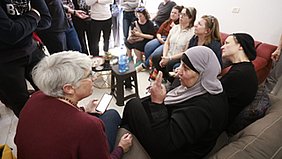In 1140 Rabbi Yehuda HaLevi wrote of his fears that when Jews had power they would abuse it, just as others. We can no longer deny that we’ve reached this point.
On Sunday evening, 26 February, hundreds of Jewish settlers rampaged in the Palestinian town of Huwara where two Israeli brothers were murdered hours before. One person was killed, several injured seriously and scores suffered from tear gas and smoke inhalation. Dozens of homes and cars were firebombed. The riot was not controlled by the Israeli army. A video segment showed a group of settlers praying with flames in the background. Their voices saying “May His great name be blessed forever” can be heard clearly. The implication that this pogrom was perpetrated in the name of Judasim, or God, is abhorrent.
The overwhelming majority of Israeli (and non-Israeli) Jews condemned this vigilante action. While private Israelis raised over one million sheqels ($275,000) in 24 hours to aid the victims of the pogrom, it is our hope and goal that the government of Israel compensates the people of Huwara for their material loss just as Jewish Israelis are indemnified for their losses in acts of terror.
On Wednesday, 1 March, I joined a solidarity mission of Israeli Jews who visited the victims in Huwara.
Please see my Times of Israel blog for a description of the experience.

